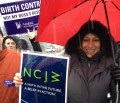News and Politics
Morning Jew: Donald Sterling’s Scary Fans, Beautiful People, Sarah Palin, and Being Menschy
On today’s Morning Jew we look at, duh, Donald Sterling - not just his racist rant, but his housing discrimination history and misogyny. Then we turn to People’s 50 “Most Beautiful” people list and wonder why there are so few Jewish punims on the list. And more.
The New Normal: Why J Street Should be Happy About Being Rejected by the Conference of Presidents
AuthorsIn a not entirely surprising vote, J Street was rejected from membership in the Conference of Presidents of Major Jewish Organizations. Despite the hand-wringing among J Street members and supporters, I think this is a blessing in disguise and says much more about the Conference of Presidents than J Street.
Morning Jew: Bubbe Clinton?, KKK “wizardry” on LinkedIn, & Pastures of Plenty at the Seder
Comedians Katie Halper and Heather Gold take down the news. Nu, is it good for the Jews? This week’s episode: Will Hillary reverse-inherit her grandchild’s Jewishness? What does a Klan wizard look like on LinkedIn? Can you guess who studied Talmud before becoming a famous fashion icon? And more. WATCH NOW
A Far Cry from Justice: The Williamsburg Shomrim 5, Taj Patterson & Our Call to Speak Out Against Racism, Homophobia and Hate
On Wednesday, five members of the Orthodox security patrol (the Williamsburg Shomrim) were charged with gang assault for the brutal beating of Taj Patterson, a 22-year-old black gay student. This is potentially a step forward, toward accountability. However, it is a far cry from real justice. As leaders of different Jewish social justice organizations, we represent a broad range of Jews, from secular to Orthodox and everyone in between, united in our commitment to social, racial and economic justice — and in our commitment to justice for Taj in this case.
Poem for the Kansas Shootings
AuthorsThen came the ox
who drank the tears
that fell from the eyes
that saw the slain
who fell from the bullets
shot from the gun
held by the hands
raised by the man
who stoked the hate
Jewish GOP Does Vegas, Generation Gap & Circumcision News-- Nu? It's Morning Jew!
Comedians Katie Halper and Heather Gold unpack the news. This week: Governors Jeb Bush, Chris Christie, John Kasich, and Scott Walker walk the walk for GOP money man Sheldon Adelson; thoughts about circumcision – it “puts everything up in front!” – and more. Can you guess which makeup-loving rock-star frontman was born an Israeli Jew named Chaim? Guess. Watch. Laugh. Share.
SPURA, SPURIOUS: A Story of Jews, Politics, and 20 Acres of Demolished Housing on Manhattan’s Lower East Side and the Lessons We Should Learn
Jews in America are as class divided as any other demographic group, and generally we act as such: not in concert, but in conflict. The SPURA saga is worth understanding, remembering and retelling because it complicates any one particular narrative about Jews and New York City’s dark history of destruction and development.
One Poll You Need to Vote In: How Should American Jewish Nonprofits and Philanthropists Spend Their Billions?
Who among us isn’t aware of the gulf between what is and what should be?
As a scrappy online Jewish magazine focused on social justice, arts & culture, spirituality and pushing boundaries, we have some pronounced views. And we know you do too.
A recent study in the Forward – which hosts and supports Zeek, but from which we have total editorial independence – is asking for feedback on the findings of its phenomenal new Jewish study, reported by Josh Nathan-Kazis. The study lays out how Jewish philanthropists and charities spend their money, based on tax reports of 3,600 American Jewish nonprofits. The findings? Some 38% of funds go to Israel-centric programs, 13% to arts and culture and a mere 6% to advocacy. Is that as it should be?
Faith Rally, Freedom & the Hobby Lobby: Standing up for Access to Birth Control at the Supreme Court
This morning, Rabbi Lori Koffman was one of many religious leaders speaking out in support of women’s access to birth control and real religious liberty as the Supreme Court hears arguments on Sebelius v. Hobby Lobby Stores and Conestoga Wood Specialties Corp. v. Sebelius, At issue: whether a for-profit company must provide full contraception coverage for employees (thanks, Affordable Care Act)!
“We are here because this is what Judaism demands of us,” she said, “to demonstrate to the Court that faith should not be used as a tool of coercion, but that it should be an instrument of freedom to guide us along our own religious and moral path, to make our own faith-informed decisions about our bodies, our families and our health.”
Psst: New Study Shows American Jews Overwhelmingly Support LGBT Rights. Far Too Quietly
This past Wednesday was a trifecta for the LGBT rights community.
A federal district court judge struck down the Texas ban on same-sex marriage, positioning Texas to join the 17 states and District of Columbia that now allow gay couples to legally wed.
The Republican Arizona governor vetoed a bill allowing refusal of services to gays and lesbians, hopefully setting a precedent for similar bills being considered in several other states. And the Public Religion Research Institute (PRRI) released a major new survey on a decade of changes in attitudes on LGBT-related issues. The research revealed a 21-point jump in support for same-sex marriage from 2003, when one-third (32%) of Americans supported same-sex marriage, to 2013, when a majority (53%) of Americans do.
Morning Jew: Dylan Farrow, David "Bridgegate" Wildenstein, Boy Who Cried Shonda, and More
“It would be good for the Jews to not have Woody Allen represent us anymore. I still want jokes, but they can be less self-loathing, and they can be jokes that aren’t based on misogyny.”
In this week’s morning Jew, Heather Gold and Katie Halper weigh in on which of the week’s headlines are good for the Jews. Dylan Farrow, David Wildstein, talmudic hate mail, and more.
Kicking Away the Ladder: Immigrants, BIDs & an Uncertain Future for Street Peddling in NYC
Will a Business Improvement District in Queens deprive new immigrants of the opportunities that helped so many Jewish families secure a successful footing for their families in the United States?
Like a lot of Jewish kids, I grew up hearing about the ways my family first experienced life in America. In 1902, my great-grandparents Solomon and Sarah Stein journeyed from Poland to Ellis Island, and the following year they had their first child. The family started out on Allen Street — now renamed “Avenue of the Immigrants” — until they crossed the Williamsburg Bridge, rented a place in Bushwick, and eventually settled in Midwood. With limited English and education, Solomon and Sarah did what they could to provide for their kids. Sarah sewed clothing at home; they couldn’t afford a storefront, so Solomon would sell the clothes in the street, going door to door building a customer base. They raised a family of five children, all of whom went to college.
Lessons From the Field: Good Neighbors, Good Wages
President Obama’s State of the Union this week is breathing life – and hope – into the conversation around raising the minimum wage. And it reminds us how local organizing can lay the groundwork for national economic justice issues. As the president put it: “It is you, our citizens, who make the state of our union strong.” Consider this: In December, Washington DC and two neighboring counties in Maryland raised their minimum wages at the same time, the first time jurisdictions aligned their strategic efforts across state lines.
The Jewish community was at the heart of this victory. Here’s what we learned.
The State of the Union: A Progressive Jewish Take: A Q & A with Abby Levine
This year’s State of the Union wasn’t a game-changer, with mainly expected positions on a checklist of issues, punctuated by a few standout, super-tweetable lines: “Give America a raise” and “Time to do away with workplace policies that belong in a ‘Mad Men’ episode.” On the other hand, I couldn’t help but be pleased by a few flourishes, like hearing the shutdown condemned in the first two minutes, and a clear dig in the president’s call for Washington to “focus on creating jobs, not crises.” I reached out to Abby Levine of the Jewish Social Justice Roundtable for her take, as someone who works everyday with American Jews to leverage their social justice efforts.
Honoring King, Fighting Fear: Why Economic Justice Must Matter to All Who Care About Racial Justice
There is a deep commitment in the American Jewish community toward ending racial injustice in our country. Jews have a long and proud history of fighting against racial discrimination in its many forms from the civil rights movement through today. As a whole, however, the American Jewish community does not share the same commitment to an overhaul of the economic systems of our country and “the radical redistribution of economic power” King advocated. What gets in our way?
Who is Boycotting Whom? National Hillel Guidelines, Dissent, and Legitimate Protest
AuthorsBoycott as Legitimate Form of Nonviolent Protest
Swarthmore Hillel’s decision to thwart the National Hillel guidelines on Israel that exclude Hillel’s sponsorship of individuals considered “anti-Israel” or “anti-Zionist” (these slippery terms are not adequately defined) has become an important moment in American Jewry’s continued struggle to come to terms with its own identity when it comes to Israel. Some of this revolves around the growing BDS movement, given new life by the recent American Studies Association decision to boycott Israeli universities and the upcoming discussion on the same topic in the Modern Languages Association conference later this month.
Of course, it is not all about boycotts, but more generally the issue of boycotts has become a test-case for Hillel’s commitment to pluralism and its intended goal of serving as a “Jewish home” on college campuses for Jews, whatever their belief, practice, or affiliation. For the most part Hillel has been exemplary in this regard, sponsoring events for all religious denominations, for secular humanists, atheists, and totally unaffiliated Jews. But as we have seen, Israel is a different story.
A Year After Newtown, How Can We Bear the Guilt?
We must say loudly: This must stop here, this must stop now! In this this week’s Torah portion — read on the one-year anniversary of the slaughter at the Sandy Hook elementary school in Newtown, CT — Jacob recognized in Shimon and Levi that they had crossed the line into a culture and a life of violence, writes Rabbi Aryeh Cohen.
#WhatRabbisDo: Human Rights Day & Modern-day Slavery in the USA
December 10th is International Human Rights Day, the 65th anniversary of the passage of the Universal Declaration of Human Rights. The UDHR enshrines the idea of the inherent dignity of human life, realized through such protects as freedoms from slavery, unlawful imprisonment, and torture, and the rights to basic needs such as employment, a fair standard of living, and medical care. This year, in conjunction with Human Rights Shabbat, rabbis in 14 cities are visiting Wendy’s restaurants to ask that the corporation sign onto one of the most successful domestic human rights campaigns, the Fair Food Program of the Coalition of Immokalee Workers.
Mourning Mandela on the Heels of Hanukkah
I learned about Nelson Mandela’s death on my way back to the office from the White House Hanukkah reception yesterday. The news was not a complete surprise to anyone as the 95-year-old Mandela had been suffering with an intractable respiratory infection for many months. But it caught me short and saddened me deeply. With Hanukkah themes fresh in my consciousness, I could not help but see connections between the holiday and this great leader’s life.
Radicalize Thanksgivikkuh: Fight for Freedom (from Hunger)
There’s certainly nothing wrong with enjoying delicious food with friends and family – that’s the best part about holidays. For those of us who can. But on behalf of the millions who can’t, I propose we embrace a far more radical interpretation of this momentous occasion.
Chanukah and Thanksgiving both celebrate the importance of freedom – freedom from oppression, from religious persecution and from want. As we gather to celebrate our hard won freedoms, we must also raise our voices. And keep raising them until everyone in America can enjoy the most basic freedom: freedom from want.
![[the current issue of ZEEK]](../../../image/2/100/0/5/uploads/leftistethicistgraphic-52842c6a.png)
- 5000 Pages of Zeek
- Founded in 2001, Zeek was the first Jewish online magazine, and we have over 5000 pages online to prove it, all available free of charge. Read more in the Archive.

















